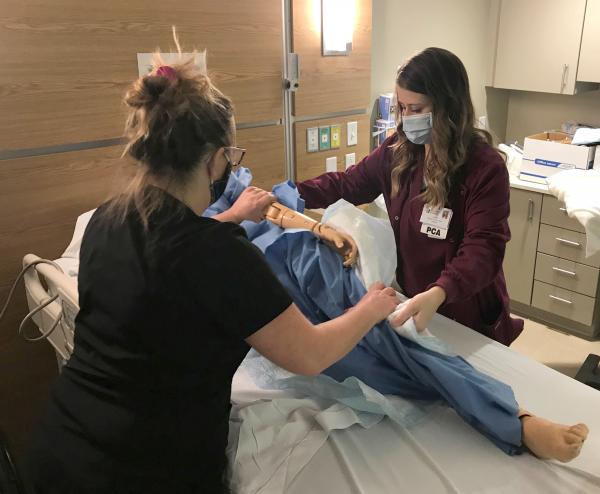Are Online CNA Classes a Good Option? Pros and Cons Compared
Wiki Article
How CNA Courses Can Assist You Introduce an Effective Job in the Clinical Field
CNA courses work as a fundamental stepping rock for individuals desiring enter the medical area (CNA Classes). These programs convey important skills, consisting of efficient interaction and personal care strategies. Pupils engage in hands-on training, linking theory with useful application. As the requirement for health care professionals expands, the role of a Licensed Nursing Assistant becomes progressively substantial. This questions concerning the numerous career paths and improvement opportunities that exist in advance for those that finish their trainingUnderstanding the Role of a Licensed Nursing Aide
The duty of a Qualified Nursing Assistant (CNA) is important to the healthcare system, acting as a necessary web link in between individuals and clinical staff. CNAs mainly aid patients with everyday activities such as bathing, dressing, and eating, ensuring their convenience and self-respect. They are often the initial point of contact for patients, supplying indispensable emotional assistance and friendship. In addition to individual treatment, CNAs are in charge of monitoring clients' vital indications, reporting modifications in condition to nursing personnel, and preserving individual documents. Their tasks extend to ensuring sanitation in client environments and helping with mobility. This function requires a thoughtful attitude, strong interaction skills, and the ability to function efficiently under stress. By assisting in a smooth operations within healthcare setups, CNAs play a considerable part in improving the total patient experience and supporting the broader clinical group in supplying top notch treatment.Secret Abilities Obtained in CNA Courses

In addition, CNA programs highlight individual care abilities, including help with day-to-day living activities such as showering, clothing, and feeding. CNA Classes. Infection control strategies are another important component, making certain that trainees comprehend how to maintain a risk-free setting for both people and themselves
Trainees gain expertise in standard medical terminology, promoting better understanding of medical care practices. Time management skills are cultivated to aid CNAs prioritize tasks successfully. In general, these essential abilities develop the structure for an effective occupation in the clinical area, preparing students to meet the diverse needs of people.
The Advantages of Hands-On Training
Gaining useful experience through hands-on training is vital for striving CNAs, as it connects the gap in between useful reference theoretical understanding and real-world application. This immersive discovering technique enables students to create important skills needed for patient care, such as effective communication, empathy, and technological capabilities. Taking part in real-life situations allows students to understand the dynamics of a healthcare setting, fostering confidence in their abilities.Hands-on training aids pupils end up being familiar with important tools and treatments, guaranteeing they are well-prepared for the obstacles of the task. It also supplies possibilities to receive immediate responses from instructors, improving the finding out experience. By working straight with clients under supervision, aspiring CNAs can sharpen their empirical abilities and discover to react to different scenarios properly. Eventually, hands-on training equips these future health care professionals with the proficiency and assurance needed to succeed in their roles.
Occupation Opportunities After Coming To Be a CNA
Various career chances await individuals who complete their CNA training, opening doors to different functions in the medical care industry. Certified Nursing Assistants (CNAs) are essential members of the healthcare group, giving straight client care in settings such as health centers, taking care of homes, and helped living centers. Their obligations can include assisting with everyday living activities, keeping an eye on crucial indications, and supplying emotional assistance to clients.Beyond standard settings, CNAs might additionally find chances in specialized locations, such as recovery facilities or home healthcare. Furthermore, some might change right into duties in administrative support or individual advocacy, leveraging their firsthand experience with patients. The need for CNAs remains to expand, driven by an aging populace and an increased emphasis on high quality person treatment. This the original source high need warranties that individuals getting in the area have a selection of options to pursue, making it an eye-catching entrance point into a rewarding career in health care.
Pathways for Development in the Healthcare Area
Development in the medical care area offers numerous paths for people seeking to improve their careers past the function of a Certified Nursing Assistant (CNA Classes). After acquiring experience, several CNAs decide to pursue further education and certifications, such as becoming a Certified Practical Registered Nurse (LPN) discover here or Registered Nurse (REGISTERED NURSE) This change frequently includes registering in connecting programs that identify their existing skillsContinual specialist advancement through workshops and workshops can maintain CNAs upgraded on sector criteria, making them a lot more affordable candidates for improvement. The health care field provides different opportunities for growth, allowing CNAs to form their job trajectories efficiently.
Often Asked Inquiries
How Much Time Do CNA Classes Generally Require To Total?
CNA courses usually take in between four to twelve weeks to finish, depending upon the program framework. Aspects such as training course strength, organizing, and the organization's curriculum layout can influence the total duration of training.What Is the Expense of CNA Training Programs?
The price of CNA training programs varies commonly, generally ranging from $300 to $2,000. Variables influencing this cost consist of place, program size, and whether the training is offered via area colleges or exclusive institutions.Are Online CNA Classes Available?

What Is the Accreditation Examination Process Like?
The qualification exam process normally entails a written test evaluating understanding and an abilities demo. Candidates should pass both parts to become licensed, ensuring they satisfy the necessary competencies needed for nursing aide duties.Do I Required Previous Health Care Experience to Register in CNA Courses?
Prior medical care experience is not a prerequisite for signing up in CNA courses. People from various histories can get in the program, as it is designed to supply comprehensive training and knowledge required for successful certification and practice.Report this wiki page